“If we find a small plank for ourselves in a raging river, then we have to grab it and swim out” is the principle lived by Liudmyla Bosyk, the editor-in-chief of the Volodymyretskyi Visnyk newspaper from the Rivne Region.
“Now, everyone is under a huge load, and in order not to burn out, to stay in the profession, you need to look for some options, find a balance, find new approaches to preserving publications and make them more powerful,” President of the National Union of Journalists of Ukraine (NUJU), Sergiy Tomilenko, emphasizes. “The main thing for us is to go through the most difficult period, when hot military operations are underway, to support our readers and Ukraine. A sustainable media will be that where the editor is sustainable. It should be a leader who does not give up and works no matter how difficult it is. After all, it is the editor who is most responsible for the successful work of the newsroom.”
Liudmyla Bosyk from the Volodymyretskyi Visnyk from Rivne Region unexpectedly became such a leader when she suddenly had to take over the post of the editor of the publication Serhii Skybchyk, who stood up for the defense of Ukraine with a weapon in hand.
“Never in my 48 years have I been in such an uncomfortable environment caused by the war as in these one and a half years. But this discomfort motivated me so much that I probably never had the energy, ideas, and tasks I set before myself and fulfilled my entire life. If we find a plank for ourselves in a raging river, we must grab it and swim out. Therefore, for me, the war is an opportunity and a need to survive, progress and still bring Victory closer,” says Liudmyla.
Volodymyretskyi Visnyk‘s all-female team managed not to lose circulation, find, and implement new projects that helped support the newspaper’s financial state. The editors are also grateful for the support provided by the NUJU.
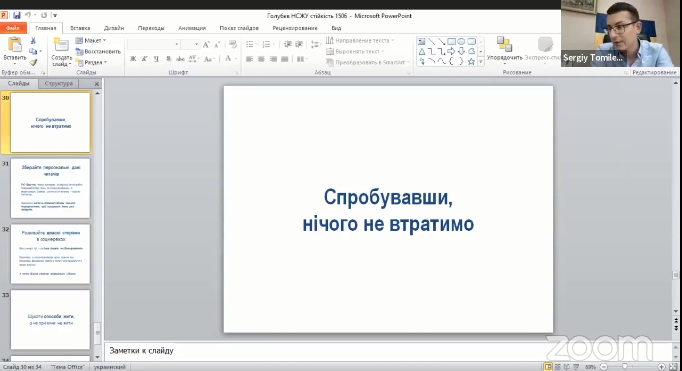
At the same time, she emphasizes: “The NUJU, its regional organization, and colleagues support us very significantly. Such support from Sergiy Tomilenko, the head of the NUJU‘s regional organization Dmytro Tarasiuk, motivates us to work even harder, find new funding sources, and participate in donor and partnership programs. I see how active and united the NUJU became during the war. And we must not allow it to be lost. We are a very powerful force!”.
Liudmyla Bosyk spoke about all this during a webinar organized and conducted by the NUJU with the support of Fondation Hirondelle and the International Institute for Regional Media and Information (IRMI, Ukraine).
Here is the text of her speech:
We had no right to leave the track.
Our Volodymyretskyi Visnyk is a regional publication with a circulation of around 3,000 copies. With the beginning of Russia’s full-scale invasion of Ukraine, on the second day of the big war, our editor Serhii Skybchyk and my military husband joined the ranks of the territorial defense forces. And I, working as a journalist, after cases were hurriedly handed over to me, find myself in the post of editor.
At first, panic broke through in our women’s team – what newspaper, they say, when there is a war outside? Then they got together and said, “We have no right to leave the track. First, as soon as we leave this job, we will die of panic. Secondly, if our editor went to fight, it means we have no right to let him down; our company must work!”
How was this year? It was one solid frame of struggle that many colleagues seemed to have had.
We didn’t miss a single issue. On March 3, 2022, the first military issue was released. It contained unique comments on the events from local and community authorities. It was hot information, actual instructions on how to act in various situations, the location of bomb shelters, etc. It was essential in the first days of the invasion. By the way, with this issue, we took part in NUJU‘s Journalists Are Important! Contest.
The way the newspaper with this information was delivered to the people is another matter as that is a question for Ukrposhta [Ukraine’s state postal service]. I will only say that there were villages the newspaper could not reach even after two weeks.
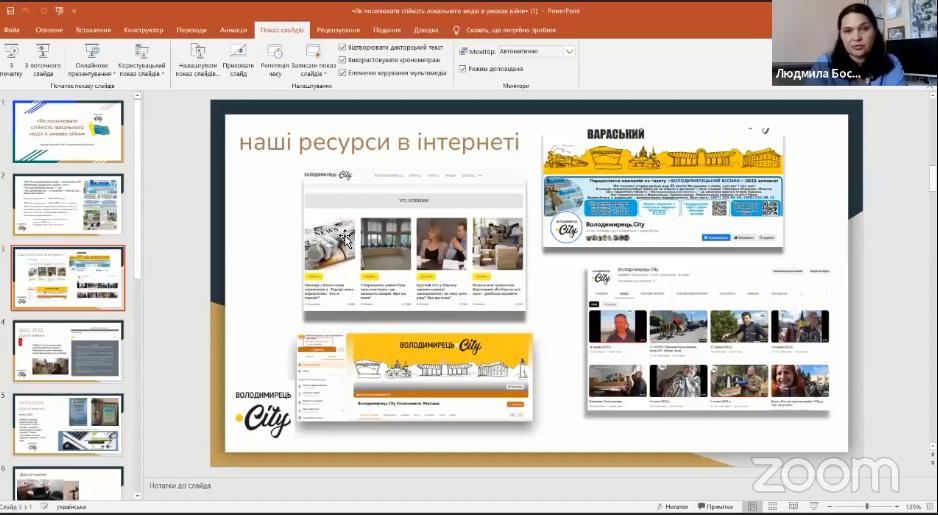
Belts were tightened, and I began looking for additional funding sources.
We all should understand that the newsroom, by and large, is in a position that is no worse or better than any other institution that is on the verge of survival today. Why? Because we are not public employees, when the end of the month comes, we get our salary.
I have 20 years of work experience in a public institution, and only when I came to the newsroom I seemed to see that money does not come just like that; it has to be earned. It was in the newsroom that I got the understanding that the word “salary” is deciphered as something that must be earned. And the editors made sure that we had the opportunity to earn it.
During the first week of the Russian invasion of Ukraine, 90% of our advertisers canceled their orders, while it made the lion’s share of what a newspaper usually lives on. Fortunately, it was very wisely done by our manager Serhii Skybchyk. In the previous few years, when money came from the subscription, the amount was divided into six months and put on deposits. That is, we had a deposit of UAH 40,000 for six months. So, in fact, we had a financial cushion in case of any force majeure.
However, we understood that there were no funds for salaries. We have an employee mobilized to the front. He was the editor, who had to be paid wages according to the law at that time. We had six people left on the staff, so a considerable amount was needed for the salary with taxes. After consulting, they tightened their belts, and everyone switched to the minimum. And I started looking for sources of additional funding.
Europe and the world had just started providing various financial aid to Ukraine, and I started searching for information about the partnership. I came across the U.S. embassy, which said that financial support could be provided for media activities if a newsroom adequately substantiated it.
There was no experience writing an application, but the knowledge gained in the master’s degree at Lviv Polytechnic, at the Academy of Modern Politics, and various courses and training sessions came in handy. I managed to write our first application; I proved that we, as a newspaper of the border zone in the conditions of military aggression, need help.
I wrote that we needed equipment, and first of all, we needed funds. And on April 1, 2022, we received the first tranche of EUR 1,000. It was a substantial wage subsidy.
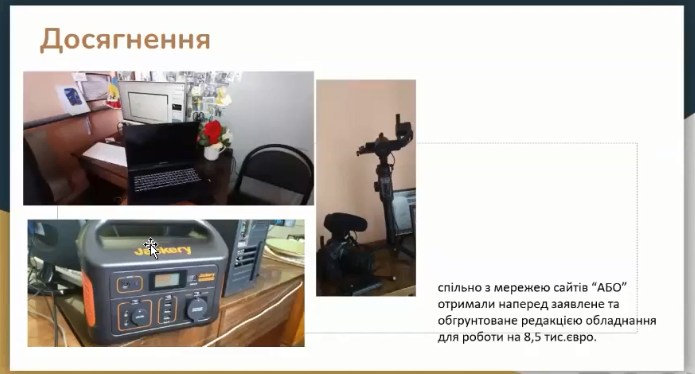
Grants help us out. Participation in grant programs is possible and useful for everyone.
If you managed to get a grant once, why won’t you succeed in the future? I began to monitor all the sources and subscribed to all newsletters so that I could quickly get information. It wasn’t easy because I remained the only journalist and had to fill the pages with new materials. So, I worked during the day and wrote applications at night.
Later, on the Ukrainian Association of Press Publishers (UAPP) website, the project Government, Community, and Newspaper appeared, and we received a tranche of UAH 50,000 for implementing the project. At the same time, implementing the project on our Volodymyrets.City website, we organized a communication platform, created a Google form, actively launched our messengers on social networks, Instagram, and Facebook, gave e-mail addresses, developed QR codes, etc. Through all these sources, people could turn to us with any problem, and we solved it accordingly with the responsible persons who published it. It worked 100% and more.
People could put their letter with a question in a special box, which we placed in places where newspapers are sold; we were stopped on the street and asked to answer their questions. And we tried to solve it, giving an explanation.
The project established communications with the authorities, the territorial center, the Social Security Administration, the police, recruiting, and other local structures.
It was a team effort of the entire editorial staff, a practice when you forget that you are tired and exhausted but you understand that you have a lot of tasks you have to solve and help with. But panic and stress recede into the background.
And now, the other day, we received a message from the UAPP about providing financial support for the implementation of the project within four months. We plan to hold a series of events to find solutions to the problems that resonate for our region.
We clearly understand that money is given to us not for eating but to benefit the community. And the second grant from the UAPP, I think, we received because we saw good results of using the provided funds there.
We participated in the OR network program – we demonstrated the newsroom to donors, and we were given the opportunity to write a grant application for the necessary equipment in a crisis, in a state of war. And here I want to say: if you are not limited in the amount, it means that you do not deny yourself anything, write everything you need.
In this application, you specify what is needed for the newsroom and how it will be used; that is, you need to show the effectiveness in the end, that your target audience will receive a result – modern, cool, compelling content.
This time I came up with an application for EUR 8,500, which was supported. To say that it was a joy is an understatement. We received an EcoFlow station; we have two powerful 27-inch monoblocks with a USB keyboard and mouse, four pockets of four terabytes each, and a server. And all this works successfully in the newsroom, and more than once, it helped us in difficult situations. I say this not to brag but to convey to everyone: participation in grant programs is real and useful.
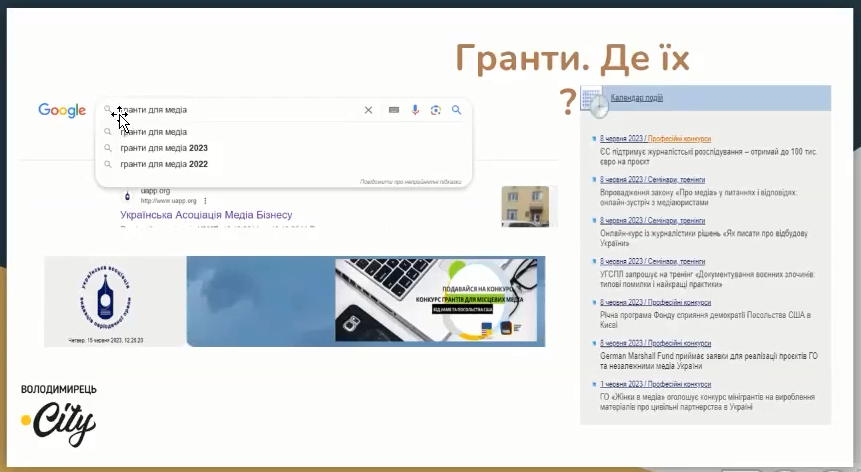
How to search for donors?
To begin with, we enter a search in Google, for example, “grants for the media, which institutions provide grants for the media.” Upon such a request, for example, I was told that the UAPP is among the grant givers. By the way, they have a calendar of events. And you can see what they offer. Currently, there is a link to donor support to the application EU Supports Journalistic Investigations, allocating EUR 100,000 to the project.
Please, look up on that site, and try it!
Next are Grants 2023 for mass media. You will flip through the pages, and everything related to grants will throw you out; there are forms for filling out applications. Similarly, Large Infrastructure Grants – House of Europe. Go to this site (by the way, they are on Facebook), and you will immediately receive news about grants for cultural specialists. (By the way, if you come across applications for programs for cultural specialists, you should understand that mass media fit into this category). There are all these instructions: how to participate, what is required for participation, what documents are needed, etc. At the same time, it is important to follow the deadline – when the application period ends.
If you are interested, try to search for Grants, and you will find many bookmarks. Sign up for the newsletter because you won’t be able to sit around the clock and look for applications that suit you. When you subscribe to the newsletter, messages will constantly come to your e-mail, and it is your job to open them, read them, and find out what directly suits you and how much strength you have to implement them.
Believe me: grants are not provided to friends only. They are available to everyone.
One of my colleagues recently said skeptically: “Those grants are useless?! If you do not find common ground with the manager, there will be no point. They keep helping the same people over and over!” So, I can tell you that both opinions are completely wrong!
If you make up the concept, and the donor sees that you clearly understand what you want and see the product, you prepare it all correctly, and the funds are given to you accordingly. We have a lot of European and international funds in Ukraine, so don’t let this money go to waste, take it and use it. Donors understand Ukrainians and simplify application forms. If you take ten proposals for grant applications, only two will be in English; the rest will be in Ukrainian.
Again, I am ready to help those who need clarifications and help at the start. Please, get in touch! I do not position myself as a master of grant business, but given that I have several successful applications, I am happy to share my knowledge with colleagues.
Sublimation adds several thousand in income every month. Advertising is back.
A few years ago, our editor Serhii Skybchyk bought sublimation equipment, and now we have our production. For example, mugs that can be found on the Internet for a lot of money can be provided by us for a normal price. We also make T-shirts, eco-bags, plates, and bowls – that is, the designer will make any design that the camera sees. At the same time, we use special sublimation paints that do not fade.
It is worth saying that in five months of this year, we earned UAH 18,000.
When this equipment was bought (somewhere in 2020), it cost about UAH 20,000; now, depending on the configuration, it is about UAH 20,000-30,000.
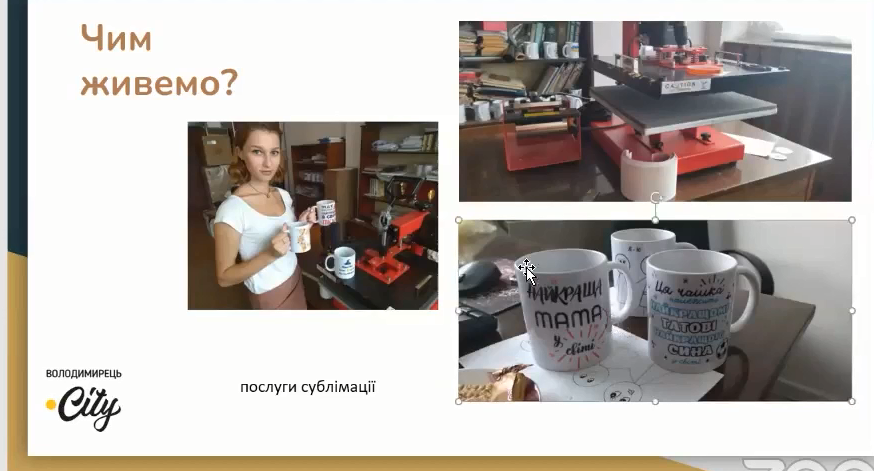
***
Advertisements for newspaper services have also risen. Many advertisers thought that we would not come out during the big war, so they cut off their contracts with us. Today, when we have ensured that we did not interrupt publishing, we already have feedback – advertisers keep coming back to us and thanking us for our stable advertising prices.
We do not jump from one price policy to another, and the most significant recognition of this work is that the other day we were paid UAH 12,000 for advertising in each issue of Volodymyretskyi Visnyk until the end of the year. Now we feel an even greater responsibility to the reader and advertisers.
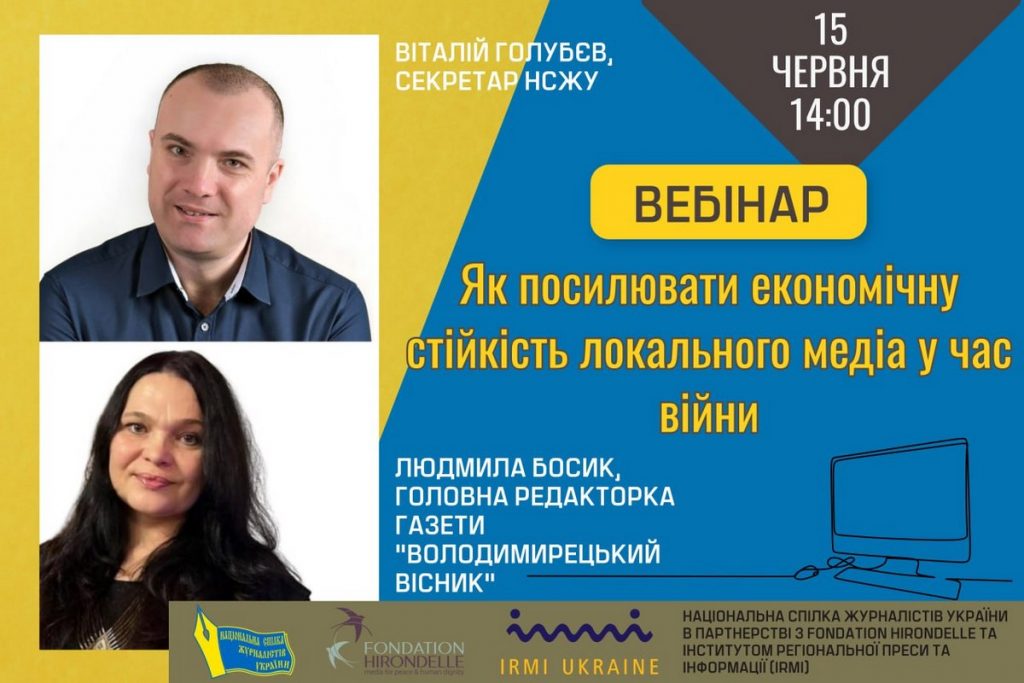
The final remark
Recently, during a conversation with the National Television and Radio Broadcasting Council of Ukraine representative in the Rivne Region, Liliya Hryniuk, I asked her a question: “Why are the official media covered with so many restrictions and rules? Why do garbage sites, various Instagram and social media pages, which shamelessly steal information to increase views, have complete freedom of action? Why are the websites of self-government bodies not taken under control when they position themselves as mass media?”
Do they want the official mass media to sit quietly and not make a fuss? But we remember that a lot depends on our information: life and the development and reputation of the community. And we will complain because we are journalists, self-sufficient people, and we will defend our free right to information.
The webinar was held by the NUJU with the support of the Swiss non-profit organization Fondation Hirondelle and the IRMI as part of the project Increasing Ukrainian Media Sustainability, financed by Swiss Solidarity.
Olha Voitsekhivska

 THE NATIONAL UNION OF
JOURNALISTS OF UKRAINE
THE NATIONAL UNION OF
JOURNALISTS OF UKRAINE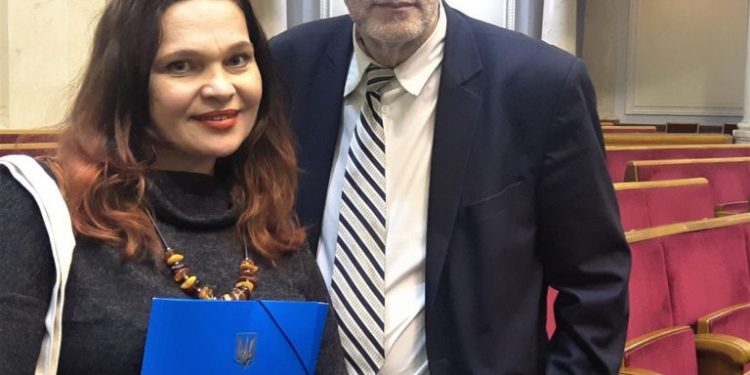
















Discussion about this post